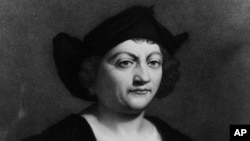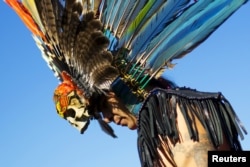The second Monday in October is the U.S. Columbus Day holiday, honoring the Italian-born navigator Christopher Columbus, who is credited with discovering the Americas, but a growing number of U.S. cities are choosing to reinterpret what the day stands for.
The actual day Columbus landed on a Bahamian island he named San Salvador, discovering an entire land mass that had been unknown to Europeans, was October 12, 1492. That date is celebrated not only by the United States, but also Spain, which supported the Columbus expedition, Italy, Colombia (named for Christopher Columbus), several other South American nations and some Caribbean islands.
Columbus Day is seen by Italian-Americans as a celebration of Columbus's heritage and their own. It is seen by Hispanics as a celebration of their culture, due to the links between Columbus and royal court of Spain and the subsequent Spanish colonization of much of South and Central America.
But as interpretations of history evolve over decades and centuries, so does good will toward one of the world's most renowned explorers. Opponents say Columbus Day glorifies a man and a culture that ran roughshod over the indigenous people who were living in the New World before Europeans arrived.
Hero or villain?
"Critics transformed Columbus into the paradigmatic dead white male," Yoni Appelbaum wrote in The Atlantic in 2012, "a symbol of the limits and costs of American opportunity."
In addition, Columbus apparently discovered America by accident, while looking for a passage to the spice-producing islands of the East Indies, which are in Asia.
"Columbus Day should be renamed 'Substantial European Naval Navigation Miscalculation Day,'" said David Larsen of Arlington, Virginia, responding to a social media query about the holiday's significance.
When Columbus Day was made an official federal holiday in 1934, it was as much a social experiment as a celebration of history. When President Franklin Delano Roosevelt designated October 12 as a national holiday, he meant it to strike down then-prevalent prejudice against Italian-American immigrants, who were seen at the time as dark-skinned and different.
"Many Americans believed Italians to be racially inferior," Appelbaum wrote, "their difference made visible by their 'swarthy' or 'brown' skins. They were often portrayed as primitive, violent, and inassimilable, and their Catholicism brought them in for further abuse."
Dark, different, and dangerous
Today, Catholicism in the United States is on equal footing with Protestantism, and Italians are just another shade of white in the American mainstream. But the holiday meant to bring Italians into the American fold now is often seen as a symbol of indigenous Americans being shut out. In many cases, they have suffered the same criticisms and stereotypes that were levied against Italian-Americans: dark-skinned, different and dangerous.
Since 1990, a number of communities have passed laws or issued proclamations declaring the second Monday in October "Indigenous Peoples Day." Madison, Wisconsin, has celebrated Indigenous Peoples Day since 2005.
Tim Fish, a resident of Madison and a member of the Muscogee Nation of Oklahoma (an indigenous tribe whose sovereignty is recognized by the U.S. government), told the news site Madison365 that the alternate observance of Columbus Day "takes into account the history and contributions of Native Americans for a more accurate historical record in remembrance of the original inhabitants of the continent."
During a city council meeting in Madison this year that approved the proclamation, Janet Saiz, a local resident who also is a member of the Ponca Nation of Nebraska, told her local-government representatives: "Thanks for recognizing the struggles and all the things the indigenous people of this state have had to contend with. I'm glad to see the city has recognized the fact that we're here, we're still alive, and we will persist in standing up for those things that we feel are important."
Concurrent celebrations
The cities of Seattle, Washington; Portland, Oregon; Albuquerque, New Mexico; and St. Paul, Minnesota, are among those celebrating Indigenous Peoples Day. Some mark the day concurrently with Columbus Day, and some cities have rejected Columbus Day altogether.
On the other hand, city councils in Cincinnati, Ohio, and Oklahoma City, Oklahoma, both rejected recent proposals for them to proclaim Indigenous Peoples Day.
Discussion about the interpretation of the day continues. Ann Marie Hughes, who now lives in Madison, is from New York City, home to a large Italian-American population and one of the nation's biggest Columbus Day parades. She says perhaps the cultural celebration needs to be separated from the Columbus anniversary.
"By losing Columbus Day, communities may lose their celebration of Italian-American culture. I am sensitive to the feelings and needs of indigenous people in our country, and can understand why Columbus Day is offensive. I would like a day where Italian-Americans can celebrate their culture without having it tied in with someone responsible for so much suffering in North America," she wrote in an email. She suggests Italian-Americans, many of whom are Catholic, might celebrate on March 19, St. Joseph's Day.
Other Americans prefer no change to Columbus Day observances. Stephen Wishnevsky of Winston-Salem, North Carolina, said in response to a social media query: "Retroactive history is bunk. You want an Indigenous Peoples' Day, then pick a day and celebrate."
And it seems people have. Other cities celebrating Indigenous Peoples Day include Phoenix, Arizona; Olympia, Washington; Berkeley, California; and Cambridge, Massachusetts.






